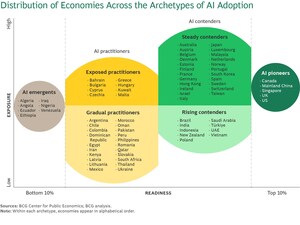- The War in Ukraine Exposes an Urgent Need to Rethink and Improve the Structure and Resilience of Our Food Systems
- Public, Private, and Social Sectors Must Collaboratively Reshape Food Systems to React Quickly When Humanitarian Needs Are Most Pressing
- New BCG Report Provides 30 Near- and Medium-Term Solutions to Make Global Food Systems More Resilient
BOSTON, May 17, 2022 /PRNewswire/ -- Russia's invasion of Ukraine is testing the capacity of global food systems to feed the world in times of crisis. An estimated 1.7 billion people—most of them in developing economies—could suffer severely increased food insecurity, higher energy prices, or greater debt burdens, according to the UN Task Team for the Global Crisis Response Group. Each of these individual factors adversely affects people's ability to feed themselves. At the same time, there is a critical need to address them more holistically and across all sectors in order to reshape our food systems so that we can counteract this humanitarian crisis—and future ones.
A new report from Boston Consulting Group (BCG), titled The War in Ukraine and the Rush to Feed the World, explores in detail the multiple direct and indirect impacts of the turmoil in Ukraine and provides 30 near- and medium-term solutions to help respond to the crisis and improve the resilience of global food systems. As the report notes, the looming global food crisis isn't about the world's capacity to produce enough food. Rather, it is about our food systems' inability to securely and equitably store and distribute enough food—and the inputs needed to produce it—in the face of the disruption caused by the ongoing war.
Together, Russia and Ukraine account for about 12% of the total food calories traded around the world, and both are critical exporters of key commodities such as wheat (28% of global trade) and sunflower oil (69%), according to the International Food Policy Institute. The UN's World Food Programme (WFP) buys from Ukraine half of the wheat it distributes around the world. Further, as exports from these countries tumble, some other leading exporting countries have announced export bans or licensing restrictions designed to protect their own food stockpiles.
As a result, prices are skyrocketing—not just for food, but also for essential agricultural inputs, such as fertilizer and fuel, that Russia has long been a key supplier of. About half of the world's people rely on food outputs that use fertilizer, and a drop in fertilizer supply could severely affect exposed populations for up to four years unless action is taken immediately to boost supplies. Moreover, the ripple effects of disruptions to the fertilizer supply chain will reach consumers worldwide.
The war's impact on fuel prices has been equally dramatic. Aside from the added cost to farmers of fuel they need to power their equipment, last-mile inland transportation account for as much as 40% of food costs in many developing countries. So as fuel prices go up, the total cost of food increases, creating a vicious cycle.
Making matters worse, the current crisis coincides with high debt levels in many developing economies around the world. Largely due to public spending to address the challenges presented by COVID-19, about 60% of low-income countries are currently in, or at high risk of, debt distress, compared with just 30% in 2015, according to the International Monetary Fund.
"While this crisis will impact all of us around the world in significant ways, low-income economies risk devastation and potential unrest," said Ertharin Cousin, CEO and founder of Food Systems for the Future, and a coauthor of the report. "We're not just talking about the poorest of the poor, who are already suffering from hunger. We're also talking about people who could recently afford a loaf of bread for their families and who now will literally be unable to do so."
Relieving the current crisis requires, most importantly, a coordinated and immediate emergency humanitarian response by all stakeholders—governments, development institutions and banks, NGOS, and private companies—to meet the most pressing needs for humanitarian aid. They must provide not only food and financial support, but also the seeds, inputs, tools, and technical assistance needed to support in-country sustainable intensification and other crop substitution actions. The report outlines a solution set of 30 key recommendations for all stakeholders. (See the exhibit.)
"There is a lot of talk about the individual components of the crisis, but it is critical that we look at things holistically and recognize the interdependence of factors ranging from rising costs of food, fertilizer, and fuel, to maxed-out debt, climate-related issues, ongoing conflicts elsewhere in the world, and COVID-19. There are multiple prongs of failure at risk of being tipped over by Russia's invasion of Ukraine," said Shalini Unnikrishnan, a managing director and partner at BCG, the global leader for Food and Nature in the firm's Social Impact practice, and a coauthor of the report.
"Just as critically, we need a coordinated effort across all sectors to rethink and repair our food systems, making them more equitable, more resilient, and more responsive in times of great need," Unnikrishnan continued. "Avoiding more such crises will require diversifying food production across diets, supply chains, and markets, and addressing the indebtedness, economic inequities, and market distortions that have contributed to the current crisis."
Download the publication here: https://www.bcg.com/publications/2022/how-the-war-in-ukraine-is-affecting-global-food-systems
For media queries, please contact Eric Gregoire at +1 617 850 3783 or [email protected].
About Boston Consulting Group
Boston Consulting Group partners with leaders in business and society to tackle their most important challenges and capture their greatest opportunities. BCG was the pioneer in business strategy when it was founded in 1963. Today, we work closely with clients to embrace a transformational approach aimed at benefiting all stakeholders—empowering organizations to grow, build sustainable competitive advantage, and drive positive societal impact.
Our diverse, global teams bring deep industry and functional expertise and a range of perspectives that question the status quo and spark change. BCG delivers solutions through leading-edge management consulting, technology and design, and corporate and digital ventures. We work in a uniquely collaborative model across the firm and throughout all levels of the client organization, fueled by the goal of helping our clients thrive and enabling them to make the world a better place.
About Food Systems for the Future
Food Systems for the Future (FSF) was founded to catalyze, enable, and scale market-driven agtech, foodtech, and innovative businesses across the value chain to improve nutrition outcomes in underserved and low-income communities. Through wraparound support to enterprises and broader ecosystem building, FSF addresses barriers to affordability, availability, and awareness of healthy, nutrient dense foods through our core services: financing, business acceleration, public policy & education, partnerships & community engagement, and nutrition expertise. FSF currently operates in the United States and Sub-Saharan Africa. To find out more, visit fsfinstitute.net.
SOURCE Boston Consulting Group (BCG)

WANT YOUR COMPANY'S NEWS FEATURED ON PRNEWSWIRE.COM?
Newsrooms &
Influencers
Digital Media
Outlets
Journalists
Opted In





Share this article